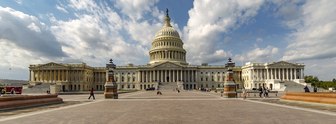President Donald Trump may want to stoke enthusiasm among his base by holding a large rally in Tulsa, Oklahoma this week—but he probably doesn’t need to. More than two-thirds of the president’s voters say they are enthusiastic about him. The latest Economist/YouGov Poll indicates that most (55%), but not all, of Trump’s voters would be willing to sign a waiver saying they would not sue if they contract COVID-19 at a rally.
One in three Trump voters (32%) would not sign the waiver to attend the rally, including more than one in four of those voters who are enthusiastic about the president’s re-election. Age matters, as a small group of younger Trump voters (those under 45) are less likely to be willing to sign a waiver. Majorities of older voters say they would sign the waiver.
Hardly any Americans have ever had to sign a similar document before attending a political event; only 6 percent say they have done so. The vast majority of Trump supporters (84%) approve of asking attendees to sign a waiver. The overall public is divided (45% to 38%).
Republicans consistently have expressed less worry than Americans overall about contracting COVID-19 themselves, and this week’s poll shows Republicans are less likely to consider the coronavirus a serious problem in their own communities. Worry is lower in small cities and rural areas, where Republicans outnumber Democrats, unlike big cities and suburbs where Democrats are more common, and concern is higher.
Both Republicans and Democrats are concerned about the impact of COVID-19 on their party’s nominating convention, but Republicans less so. Half of registered voters don’t believe it is safe to hold conventions this year, but by two to one, Republicans believe holding the conventions will be safe. A majority (55%) of Democrats would cancel the conventions, and three in five (60%) Republicans would hold them.
Republicans approve of moving their party’s convention to Jacksonville, Florida by more than two to one (54% to 24%), as there can be larger crowds there than those that would be allowed in Charlotte, North Carolina. But, they still want social distancing at the convention by a wide margin. Social distancing at the convention is even more popular with Democrats and Independents.
Even the most enthusiastic Trump voters believe conventions should observe social distancing (45% to 35%).
The size of the convention crowd may not matter to some voters, though Republicans are less sure. By almost three to one, Americans don’t think it is necessary for a lot of people to be at a convention. Those who currently say they will vote for Trump are evenly divided: 42 percent say it’s necessary for a lot of people to attend the conventions, 40 percent say it is not.
See the toplines and crosstabs from this week’s Economist/YouGov Poll
Related: Should Juneteenth be a national holiday?
Methodology: The Economist survey was conducted by YouGov using a nationally representative sample of 1,500 U.S. adult citizens interviewed online between June 14 - 16, 2020. This sample was weighted according to gender, age, race, and education based on the American Community Survey, conducted by the US Bureau of the Census, as well as 2016 Presidential vote, registration status, geographic region, and news interest. Respondents were selected from YouGov’s opt-in panel to be representative of all US citizens. The margin of error is approximately 3.2% for the overall sample. The 2020 Vote variable is defined by the registered voters who selected either Biden or Trump in a trial heat.
Image: Getty











